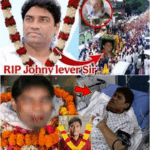At the age of 81, #ShibuSoren passes away — a devastating blow to Hemant Soren, who is heartbroken and in tears.
.
.
Jharkhand has plunged into mourning with the passing of one of its most iconic leaders — former Chief Minister and Jharkhand Mukti Morcha (JMM) patriarch Shibu Soren. Affectionately known as “Guruji,” Soren breathed his last at Delhi’s Medanta Hospital at the age of 81, after a prolonged battle with kidney-related ailments. His death has left a void not just in the political realm of Jharkhand, but in the hearts of millions who revered him as the voice of the tribal population and a father figure of the Jharkhand movement.
According to official sources, Shibu Soren had been undergoing treatment for several weeks at the Medanta Hospital. He was admitted in the last week of June as his health condition deteriorated. For the past several days, he was on ventilator support, and despite the best efforts of the medical team, he could not be revived. His condition had become increasingly critical, and the end came peacefully in the early hours of the morning, surrounded by close family members.

Hemant Soren: A Son’s Grief and a Leader’s Responsibility
Current Jharkhand Chief Minister Hemant Soren, who is also Shibu Soren’s son, was present at the hospital when the tragic news unfolded. Deeply heartbroken, Hemant took to social media platform X (formerly Twitter) to share his emotions with the world. “Adarniya Deshom Guru ji hum sabko chhod kar chale gaye (Our beloved Deshom Guru ji has left us). Today I feel completely empty,” wrote Hemant, expressing both his personal loss and the magnitude of the void his father’s passing has left.
The post struck a chord with many, as tributes started pouring in from across the nation. From politicians to civil society members, from tribal leaders to grassroots activists — everyone acknowledged the immense contribution of Shibu Soren in shaping Jharkhand’s identity and empowering its indigenous people.
A Lifelong Struggle for Tribal Rights
Born on January 11, 1944, in Nemra village of present-day Jharkhand (then Bihar), Shibu Soren’s political journey was shaped by the struggles and injustices faced by tribal communities in the region. His father was killed by moneylenders when Soren was still young — an incident that left a deep scar on his psyche and became the seed of his lifelong crusade against exploitation.
He co-founded the Jharkhand Mukti Morcha in the early 1970s with the aim of fighting for tribal rights and demanding a separate state of Jharkhand. Soren mobilized thousands of indigenous people across the Chotanagpur and Santhal Pargana regions, challenging the dominance of landlords, corrupt officials, and exploitative businessmen. His political movement was not just about statehood; it was about restoring dignity, rights, and identity to a population long marginalized by mainstream systems.
The movement gathered strength over the decades and culminated in the formation of Jharkhand as a separate state on November 15, 2000 — a historic moment that validated Soren’s struggle and positioned him as one of the most respected tribal leaders in Indian history.
Political Journey and Leadership Roles
Shibu Soren served as Jharkhand’s Chief Minister three times — first briefly in 2005, then again in 2008, and for a longer tenure from 2009 to 2010. Though his stints were often cut short by political instability and shifting alliances, his influence on state politics remained unshakable. He also served as Union Minister for Coal in the UPA government under Prime Minister Manmohan Singh.
Despite controversies and legal challenges over the years, Soren remained a formidable force in state politics. His grassroots connect, especially among the tribal population, ensured that the JMM retained its core support base even during turbulent political phases.
Under his leadership, the JMM focused on social justice, land rights, and preserving the cultural identity of tribal communities. Soren was instrumental in enacting and advocating for laws such as the Chotanagpur Tenancy Act and Santhal Pargana Tenancy Act, which aimed to safeguard tribal land from illegal acquisition.
Legacy of a Revolutionary Leader
Shibu Soren was more than a politician; he was a symbol of resistance and a beacon of hope for millions who believed in the idea of an inclusive Jharkhand. His role in awakening social and political consciousness among the indigenous communities cannot be overstated. He empowered generations of tribal youth to rise above systemic discrimination and claim their rightful place in society.
His followers often referred to him as “Dishom Guru” or “Guruji” — an honorific that underscored not just his political stature but his spiritual and emotional influence over the people. He was a mentor to many, and even in the later stages of his life, remained involved in guiding the party and shaping policies through his insights and experience.
Tributes Pour In from Across the Country
Following the announcement of his demise, condolences started pouring in from all corners of the country. Prime Minister Narendra Modi, in a heartfelt post, called Soren a “stalwart of tribal empowerment and a key figure in India’s regional politics.” Congress President Mallikarjun Kharge, West Bengal CM Mamata Banerjee, and Odisha CM Naveen Patnaik also paid rich tributes, hailing Soren’s legacy as one that would inspire future generations.
Prominent social activists, tribal leaders, and community organizations expressed grief and gratitude in equal measure. The Jharkhand government has announced a three-day state mourning period. The national flag will fly at half-mast, and all official events have been cancelled during this period.
Soren’s mortal remains will be brought to Ranchi for last rites, and a grand public tribute is being planned where citizens will get a chance to pay their final respects. Thousands are expected to gather, not just to bid farewell to a leader, but to honor a revolutionary spirit.
A Personal Loss, A Political Challenge
For Hemant Soren, the loss is both personal and political. In the midst of navigating the challenges of governance, he must now shoulder the emotional and symbolic mantle of his father’s legacy. Many political analysts believe this could mark a turning point for the JMM, as it faces the future without its founder at the helm.
However, the party remains strong under Hemant’s leadership, and the outpouring of public sentiment suggests that Guruji’s legacy will continue to guide the political roadmap of Jharkhand.
Conclusion: The End of an Era
The death of Shibu Soren marks the end of an era — not just in Jharkhand’s political history but in the broader narrative of tribal assertion in India. From a village boy who lost his father to a man who fought tirelessly for justice, statehood, and dignity, Soren’s journey is etched into the soul of Jharkhand.
As the state mourns the loss of its most beloved leader, one thing remains certain — his contributions, struggles, and victories will continue to resonate for generations to come. Shibu Soren may no longer be among us, but his spirit will forever live in the forests, the hills, the struggles, and the dreams of Jharkhand.
Rest in peace, Guruji. You will never be forgotten.
PLAY VIDEO:
News
Sıla Türkoğlu’nun Evlilik Bombası: Hülya Ceyhan, Halil ile Zaten Evli Olduğunu İddia Ediyor! 💥
Sıla Türkoğlu’nun Evlilik Bombası: Hülya Ceyhan, Halil ile Zaten Evli Olduğunu İddia Ediyor! 💥 . . Türk Televizyon Dünyasını Sarsan…
Aslı Enver’in beyin tümörü haberine ilk tepki: Gereken neyse yapacağız 💪❤️
Aslı Enver’in beyin tümörü haberine ilk tepki: Gereken neyse yapacağız 💪❤️ . . Aslı Enver: Gücün ve Umudun Sembolü —…
Mert Ramazan Demir, Afra Saraçoğlu için evini değiştirdi: “Geçmişin izlerini silemedim.” 💔🏠
Mert Ramazan Demir, Afra Saraçoğlu için evini değiştirdi: “Geçmişin izlerini silemedim.” 💔🏠 . . Mert Ramazan Demir ve Afra Saraçoğlu…
Afra Saraçoğlu bu durumu şu sözlerle noktaladı: “Mert ile aynı projede tekrar yer alacağım.” 🎬
Afra Saraçoğlu bu durumu şu sözlerle noktaladı: “Mert ile aynı projede tekrar yer alacağım.” 🎬 . . Afra Saraçoğlu’ndan Şok…
Hazal Subaşı, Erkan hakkında verdiği bir röportajda kalbini açtı: “Kırgın değilim ama yorgunum.” 💔😔
Hazal Subaşı, Erkan hakkında verdiği bir röportajda kalbini açtı: “Kırgın değilim ama yorgunum.” 💔😔 . . Hazal Subaşı Sessizliğini Bozdu:…
Erkan Meriç, Hazal Subaşı ile birlikte bir fotoğraf paylaştı 📸💫
Erkan Meriç, Hazal Subaşı ile birlikte bir fotoğraf paylaştı 📸💫 . . Erkan Meriç ve Hazal Subaşı Yeniden Birlikte mi?…
End of content
No more pages to load











